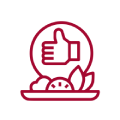 Food Safety
Food Safety Food safety is a shared responsibility between governments, producers, and consumers.
1 in 10 people get sick each year from contaminated food. Common symptoms include:
- Stomach pain
- Vomiting
- Diarrhea
- Fever
To help keep you safe from food poisoning and foodborne diseases, follow the below precautionary actions:
- Keep your hands clean while handling food.
- Wash fruits and vegetables thoroughly before cooking and before eating them fresh.
- Avoid keeping ready-to-eat food hot or chilled at room temperature for long time.
- Avoid buying uncovered foods and foods exposed to any source of contamination.
- Read the food label to identify the content and expiration date.
- When eating from a buffet, use serving utensils and avoid touching foods with your hands.
- To avoid cross-contamination in buffets, don’t use the same serving utensils of different food items that may contain allergens.
- If you’re feeling unwell, contact a healthcare practitioner immediately
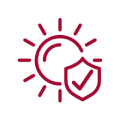 Sun Safety
Sun Safety Daytime temperatures in Qatar during November and December can range from 20 to 30 degrees Celsius. Prolonged exposure to the direct sun can be harmful to your health and lead to sunstroke and sunburn.
Overheating can be a serious risk to your health. Signs of heat stress are:
- Severe dizziness
- Body no longer sweating
- High body temperature
- Redness of the skin
- Confusion
To stay safe when outdoors, follow these precautionary actions:
- Wear loose-fitting light-colored clothing
-
Stay hydrated: drink lots of water and other healthy fluids at regular intervals throughout the day
-
Wear a hat and sunglasses when in direct exposure to the sun
-
Where possible, limit your time in the direct sun between 11am and 4pm
-
Apply sunscreen, with a sun protection factor of at least 30+, and reapply every 2-3 hours
-
Take extra precautions for children and elderly people who are at higher risk of heat stroke
If you or someone you are travelling with experience signs of heat stress, make sure to:
- Seek medical attention immediately
- Cool down by sitting in the shade, take off warm clothing, and drink water
- Cool the body with a wet cloth or using a fan
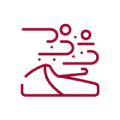 Dust Storms
Dust Storms Dust storms, though rare in November and December, can reduce air quality and visibility and may have adverse effects on people’s health. Exposure to a dust storm may lead to irritation to the eyes and upper airways, especially for vulnerable population groups including young children, the elderly, and people with respiratory conditions, such as asthma, bronchitis and emphysema.
To reduce your risk of adverse health effects in the event of a dust storm, follow these precautionary actions:
- Limit the time you spend outdoors
-
When outdoors, cover your nose and mouth with a face mask to prevent breathing in dust particles.
-
Avoid vigorous physical activity outdoors.
-
Stay indoors, with windows, doors and air vents closed.
-
Stay in air-conditioned premises, if possible, and switch AC to “recycle” or “recirculate” to reduce dust entering
-
Wash your face, nose, and mouth frequently.
-
In the event that dust/sand gets into your eyes, do not rub them and rinse immediately with water.
If you experience persistent symptoms including shortness of breath, coughing, wheezing, or chest pain, seek medical advice.
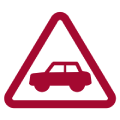 Road and transportation safety
Road and transportation safety
To help you stay safe and avoid injury when travelling around Qatar, follow these precautionary actions:
Drivers
- Drive within the speed limit and consider pedestrians
- Do not use your mobile phone while driving and follow all road laws of Qatar.
- If travelling as a passenger, demand that the driver of your vehicle adheres to these safety measures.
-
Use a seatbelt or a car seat [for children] on every trip, regardless of whether you are in the front or rear row of the vehicle.
Pedestrians
- Wear bright-colored or reflective clothing when walking at night or in poor visibility.
-
Walk only on sidewalks and on designated pedestrian crossings or crosswalks.
-
Walk in single file if you’re a group, especially on narrow roads and if it is getting dark
All-Terrain Vehicles (ATV) Users
- It is recommended that children under the age of 12 should not ride or drive an ATV.
-
ATVs are intended as single rider vehicles. Do not have more than one person on an ATV at a time.
-
Always wear a helmet.
-
Wear bright-colored or reflective clothing and turn on your headlights.
E-scooters and Bicycle Users
- E-scooters and bicycles are designed for one person only. Do not have more than one person on an E-scooter or bicycle at a time.
-
Always wear a helmet
-
Wear bright-colored or reflective clothing
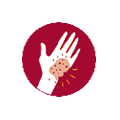 Skin Diseases
Skin Diseases
Skin diseases are among the most common of all human afflictions. Limit your potential exposure by:
- Avoid sharing beddings, clothes, or towels.
- Keeping your hands clean, using soap and water or an alcohol-based sanitizer.
- If you or someone you are traveling with develops a new rash, immediately seek medical advice.
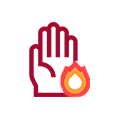 Burn
Burn Stay aware of basic guidance on first aid for burns as follows:
- Extinguish flames by allowing the patient to roll on the ground, or by applying a blanket, or by using water or other fire-extinguishing liquids.
- Stop the burning process by removing clothing and wetting the burns
- Use cool running water to reduce the temperature of the burn.
- Do not apply paste, oil, or raw cotton to the burn.
- Do not apply ice because it deepens the injury.
- Do not apply any material directly to the wound as it might become infected.
- Avoid application of topical medication until the patient has been placed under appropriate medical care.
